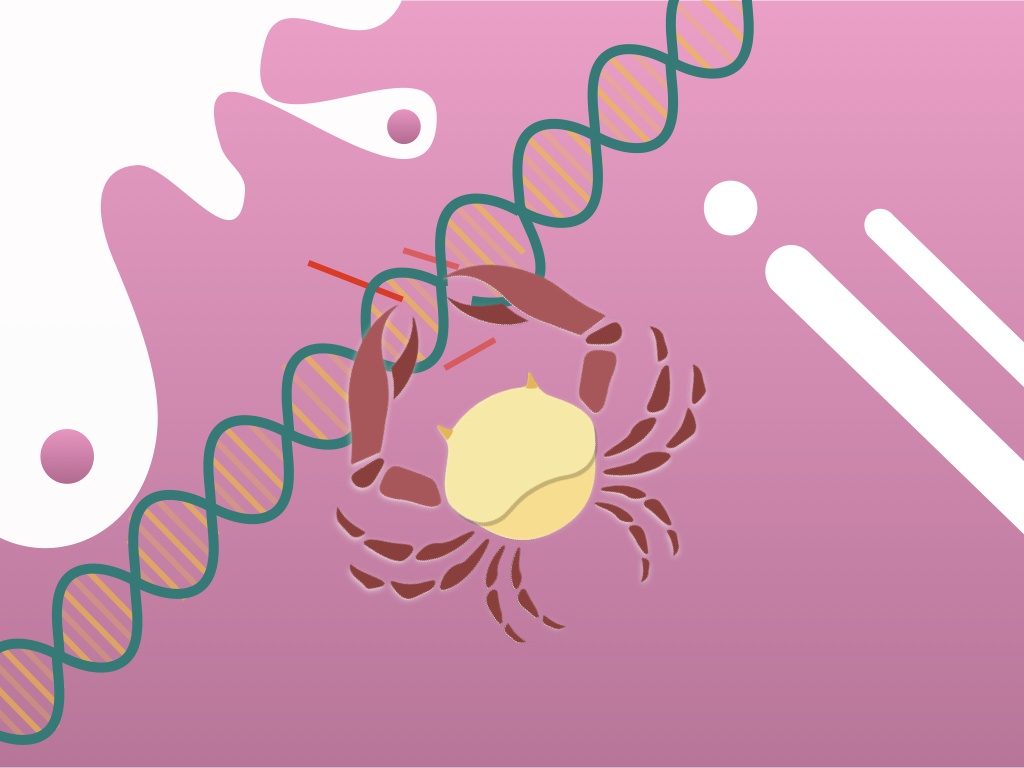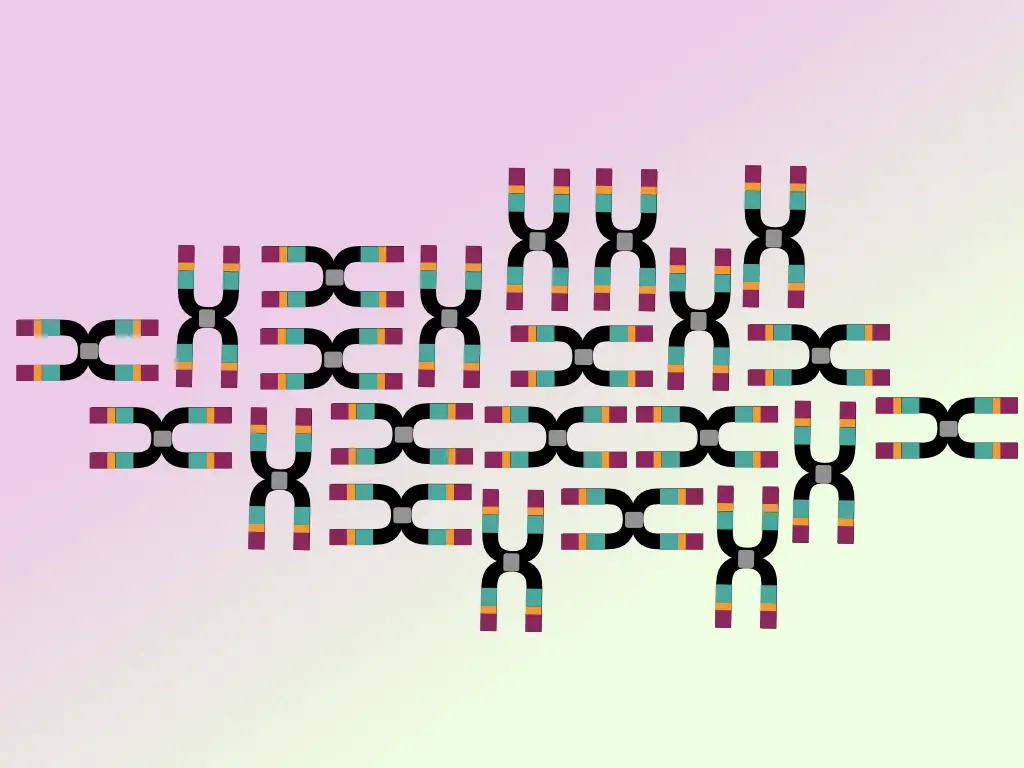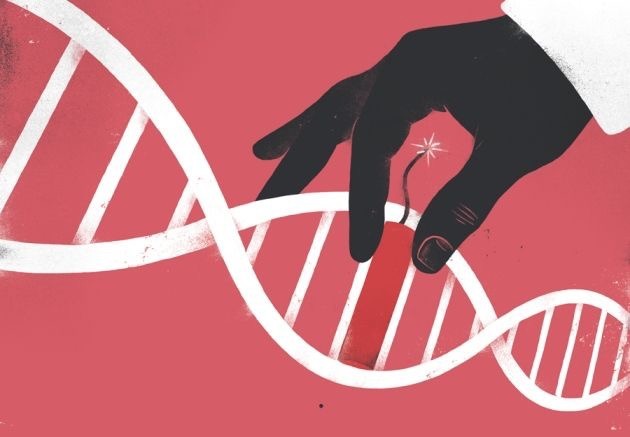“A laboratory test used for determining, monitoring and measuring cancer by testing DNA, genes or chromosome is known as cancer genetic testing.”
Let us start with cancer itself,
Cancer genetics is indeed a broad subject. It includes the study of cancer, carcinogens and tests or methods used to determine it. Further, using some methods the probability of having cancer can also be measured.
In a layman language, we can say, a DNA, gene or chromosome testing used to determine the role of genes and mutation associated with cancer is known as genetic testing for cancer.
It is employed to know whether the gene mutation or (a group of) mutations are associated with a particular type of cancer or not.
Not only for this, but it is also beneficial in other various processes that we are discussing in the present article. But before that let us discuss some important information needs to understand the topic.
Genes are a chain of DNA, functionally encodes proteins and are located on chromosomes. Any sudden or unsudden change in genes causes mutations. Genetic mutations can alter the function of a protein and causes serious health problems.
Likewise, change in genes (mutations) causes cancer as well. A mutation is a random process. It occurs at birth, after birth or at any stage of one’s life.
Cancer is a process of abnormal cell growth and division. During the process of cell division, cells divide and genetic material copied from one cell to another. The entire process is controlled by some genes.
If those cells are gone mutated the process of cell division disturbed, cells divide continuously and abnormally. That produces cancer.
Cancerous cells are continuously dividing. Gene or chromosomal mutations are indeed the reason for the origin of cancer.
Interestingly, those mutations can be either inherited from parents or originated by gene-environmental interaction. Some of the mutagens and consumption of tobacco are also reasons for it.
Read further: Mutagen: Definition, Types And Effect.
So only a few types of cancer are actually inherited while some others are induced after birth due to some mutagenic exposure.
List of some inherited cancer types is given below.
| Inherited cancer syndromes |
| Types of Skin cancer |
| Breast cancer |
| Ovarian cancer |
| Prostate cancer |
| Eye cancer |
| Bowel cancer |
| Kidney cancer |
Note– Keep in mind that, the inherited cancers syndrome can pass on but it doesn’t always cause cancer. It simply means that the chance of the occurrence of cancer is high in their family.
In the present article, we are going to discuss on gene testing for cancer, what are the types and how it is done.
Key Topics:
What are cancer-causing genes?
As I sai, cancer is a process of uncontrolled cell division, think about the car running on high speed without breaks!!
That exactly the cancer is! Two types of genes cause cancer– oncogenes and tumour suppressor genes
Oncogenes-
The types of proto-oncogenes are the class of genes (usually transcriptional factors), that helps in cell growth or division. Once they got mutated, their overexpression leads to cancer.
Notably, here some oncogenes induced mutations are inherited as well if it occurs in germ cells.
Tumor suppressor genes-
It suppresses the tumor or uncontrolled cell division.
But when TS genes mutated their activity or normal functions lost. Their power to stop or suppress the cell division also lost and causes cancer.
The oncogene-induced cancers are occurred due to the gain of function mutations, it turns on the gene expression.
While the tumor suppressor gene induced mutations are caused due to the under expression of TS genes. It turns off the gene expression.
Key information– only 50 types of hereditary cancers syndromes are identified till date. Among them, majorities of inherited cancer follow the autosomal dominant pattern of inheritance (Only a single copy of a gene is enough to cause cancer).
What types of genetic testing are available?
Before go ahead to how cancer genetic testing is performed, let’s understand in which conditions gene testing are used in case of cancer. Different types of gene testing are discussed below,
Predictive gene testing:
The predictive gene testing is used to find out the probability of cancer inheritance in a person life. The test finds the risk of cancer in a person.
In a simple, language, we can say, the test predicts the likelihood of cancer with or without a family history.
Presymptomatic gene test:
The present type of gene test is often employed to find out whether a person with a family history of a cancer disease suffering from gene mutations or not. It tests if the disease occurs before developing sign and symptoms or not.
Pre-before, Symptomatic- symptoms of the disease.
Carrier testing:
The carrier gene testing isn’t used so often in case of cancer, however, for hereditary cancer syndromes, it is done to look after persons genetic condition.
Prognosis testing:
Using cancer or mutant cells, a gene test is practised to find out the prognosis of the disease. Prognosis gene testing closely monitors the spreading of cancer in different tissues or organs.
Diagnostic gene test:
The present type of gene test is used to confirm a person’s condition associated with cancer if he or she is suffering from cancer or not.
Preventive gene testing:
Another innovative use of gene testing in cancer is to prevent cancer. Gene test is used to validate treatment or therapy success in case of cancer.
For example, if a person is treated with gene therapy for some kind of cancer. The success rate of it is determined using gene testing. See the image below,
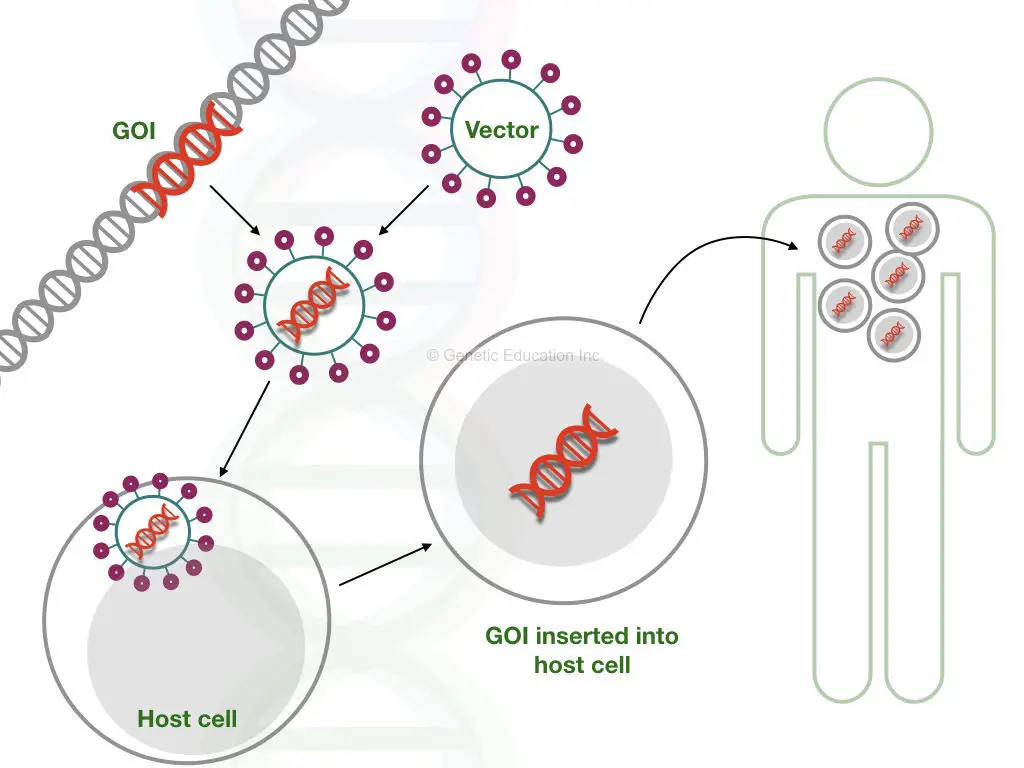
All these types of cancer gene testing are adopted for different purpose however, the process of testing might be the same.
We knew how genetic testing is done, hence it isn’t much important. In which conditions the cancer gene testing is advisable is more significant.
Also read: What is Gene Therapy? and How Does it Work?
Let’s move to another important section of this topic.
Who needs cancer genetic testing?
In the case of the family history of cancer or inherited cancer, a person should go for genetic testing. The risk of cancer can be determined by the condition of a person if he or she is inherited single or two copies of the cancer-causing gene.
For example, in the case of breast cancer, BRCA1 and BRCA2 gene mutations are inherited in an autosomal dominant fashion. Only a single copy is enough to cause disease.
A person suffering from many different types of cancer should have to test for cancer.
If a person’s relatives have diagnosed with any type of cancer, he or she has to go for gene testing.
A person already diagnosed with cancer in early age must have to go for genetic testing to known for their genetic condition.
Cancer can spread from one paired organ to another, easily. Thus for cancer in paired organs like kidney or breast, gene test to determined cancer is highly advisable.
Interestingly some races or ethical groups are more at risk of cancer. For instance, the Jewish ancestry linked to ovarian and breast cancer. For those populations, genetic testing is highly recommended.
How it’s done?
Unlike other diagnostic methods, the gene testing is much easier, however, it’s complicated. A DNA test is another name used for it. Although, DNA or gene test is not the only type of tests used for cancer genetic testing.
The chromosome test also known as karyotyping is employed to determined alterations in chromosomes related to the present condition. Here we are discussing how genetic testing, especially for cancer, is done.
Sample collection:
Collecting a biological sample is the first step for testing genes.
Any bodily samples can be isolated and collected for DNA extraction. Blood, saliva, tumor cells, bodily fluids or solid tumor tissues are generally used.
DNA extraction:
For gene or DNA testing, we first required a good amount of DNA. For that, we have to do DNA extraction. Various protocols and kits are now commercially available for extracting DNA.
Testing gene or DNA:
In the next step, using PCR (polymerase chain reaction), DNA sequencing or DNA microarray the testing is done.
PCR– Cancer-causing genes can be amplified in PCR. Further, some mutations related to specific cancer can also be determined. However, PCR can’t identify many mutations at once. Even, new alteration can’t be determined.
Read on PCR: Polymerase chain reaction.
DNA sequencing– Any known or unknown mutations in a gene related to cancer can be identified and quantified using the sequencing. Employing the genome sequencing, the entire genome of a person is screened for identifying gene’s association with cancer.
Read on sequencing: What is DNA sequencing?
DNA microarray– Though it is known as DNA microarray, instead of DNA, RNA is used for doing it. In the microarray technique, the expression of a particular gene or many genes associated with cancer can be quantified.
Furthermore, evaluation of SNPs and genome-wide association studies can also be done to find out links of various mutations in cancer.
FISH and karyotyping– FISH and karyotyping are cytogenetic techniques sometimes used for detecting cancer. For example, the chromosomal translocation in case of the leukaemia (Philadelphia chromosome) can be determined using either of the technique.
Although FISH is more accurate than karyotyping.
Read more on FISH: Fluorescence in situ hybridization.
Now we aren’t explaining all things in-depth, we have already covered many articles on it. For each technique, the article’s link is given. You can read it from there.
Analysing results:
Expert genetic practitioner or genetic counsellor can only analyse or interpret the results of a genetic test. The entire process of the present technique is explained in the figure below,
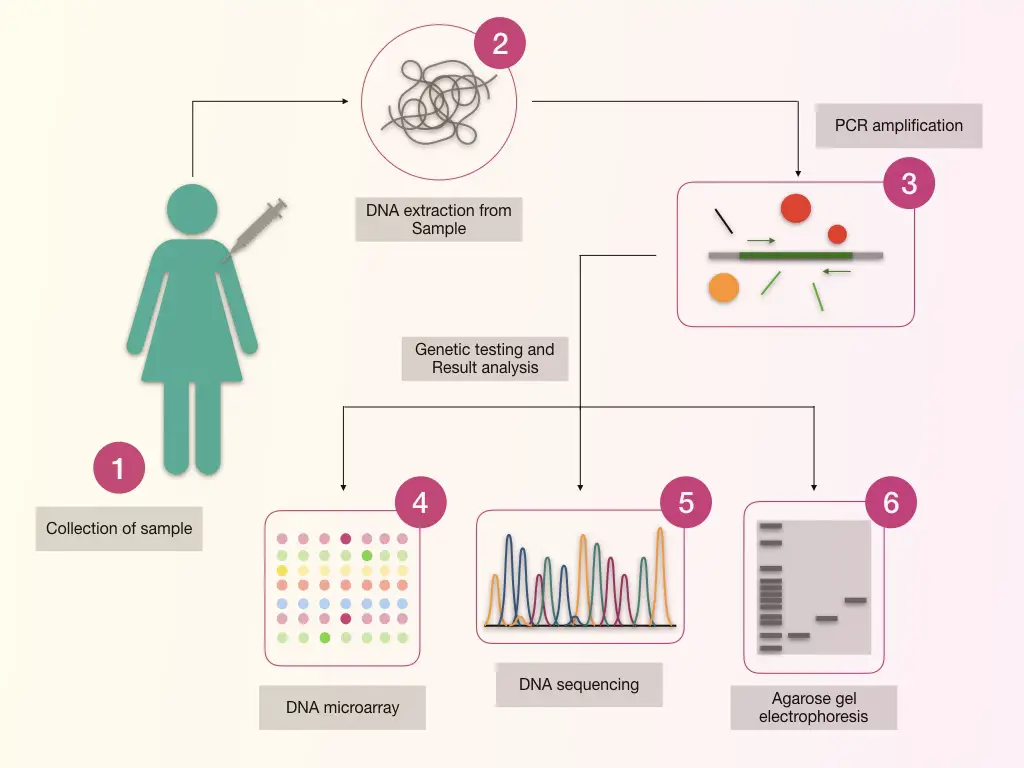
What do the results mean?
Unlike other laboratory tests, as I said, genetic testing is not so common. Therefore for performing and evaluating results of it needs experts.
A doctor having specialised expertise in genetics or only a genetic counsellor can interpret the results. The results of cancer genetic testing might be positive, negative or unidentified or nonsignificant.
The positive results–
It isn’t important how they get positive results, rather, what to do after that is more important. In the case of the inherited cancer syndrome, the positive results indicate, the presence of allele or variant that may cause cancer.
It means that,
- The person is suffering from cancer or has a mutant allele.
- Their family members are at risk of cancer.
- A person may suffer from cancer in future.
- The risk of cancer occurrence in future is more eminent.
- Furthermore, the positive results help to make decisions in certain conditions.
A person having a risk of cancer can take early preventive actions against it. For example, he or she can stop smoking or consuming tobacco, can take medicines or change diet/ lifestyle to prevent it.
Also, it aware high-risk families to take preventive actions and make decisions on it. Families can even go for genetic testing to identify the mutant variant or allele.
Positive results are also beneficial in selecting the treatment against a particular type of cancer.
In short, positive results mean, a person has a mutant allele or cancer-causing variant, he or she may develop cancer or any of their family members can have that variant. Their chances of developing cancer in future are more than the normal population.
Allele: an alternative form of a gene
Negative results–
The negative results indicate that the person doesn’t have the mutant allele or variant.
The negative results are more crucial than the positive one. In cases of the familial cancer syndrome, the NRs are analysed carefully. Why? Because it states that the person who is from the family of inherited cancer syndrome hasn’t had the mutant allele. He or she is totally fine.
Still, a person may develop cancer. Their risk of being affected is equal to any person of the normal population but lower than the high-risk families.
Uncertain results–
Usually, genetic test results are cross-checked twice, still, there is a chance of uncertain results.
The uncertain results are neither clear nor conclusive. This type of results can’t be concluded and consider as non-decisive. A person can’t rely on it.
Notably, positive results don’t mean that the person will surely suffer from cancer. It shows that the risk of developing cancer is higher in comparison with the normal population.
Contrary, the negative results do not consider that the person will remain unaffected throughout their life.
Some alleles are more commonly present in some population or ethnic group. Those common alleles are known as benign allele or benign variant. A positive result, in this case, doesn’t indicate cancer because the variant is commonly present in all people of that ethnic group.
“No test results are 100% accurate and reliable.”
Genetic testing for cancer is not fully guaranteed but it is more trusted than other lab tests. What it predicts is only the presence or absence of an allele (normal or mutant) but it does not predict the disease status or situation.
Furthermore, it shows the probability of the disease occurrence in comparison to other individuals of the population. Still, the genetic or gene test results are 99.10% accurate and reliable.
For which type of cancer a genetic test is done?
Though, genetic testing is more commonly advisable for inherited cancer syndromes. Using the whole genome sequencing method, any genetic variant or mutations associated with any type of cancer can be identified and studied by genetic testing.
Genetic testing is practised commonly for the cancer types listed below,
- Breast cancer
- Ovarian and cervical cancer
- Prostate cancer
- Thyroid cancer
- Stomach cancer
- Skin cancer
- Sarcoma
- Pancreatic cancer
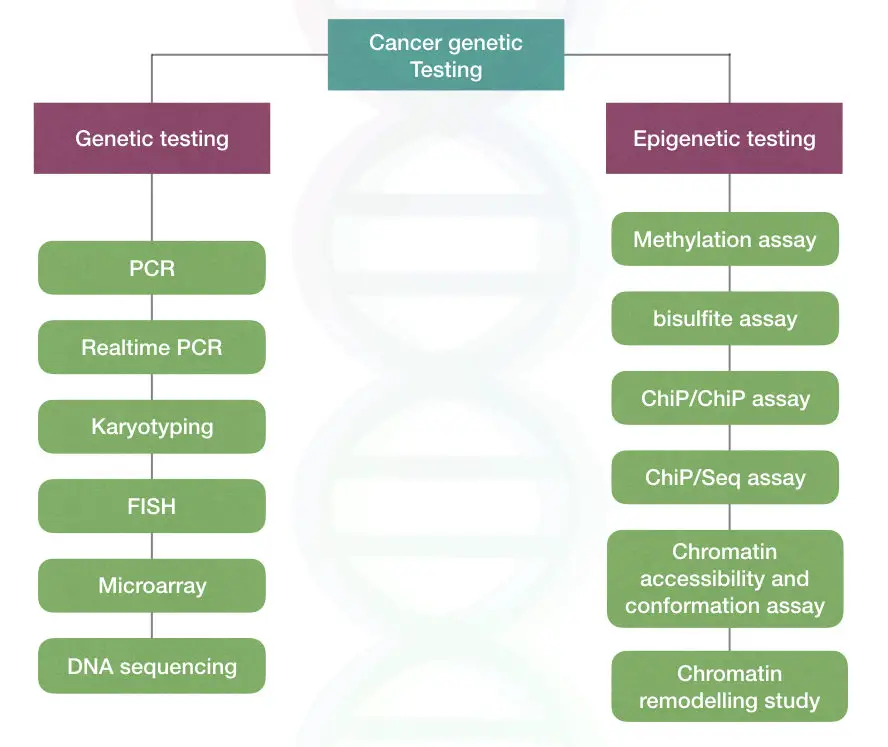
How genetic testing influence a person?
Prior permission or consent must be required before proceeding for genetic testing.
It affects persons personal as well as family life. In case of positive results, a person may feel anxiety, guilt, depression or emotional trauma. Because genetic testing is costlier, he or she or their families have to face a financial burden as well.
A genetic test can impact deeply a person emotionally, socially, physically or economically.
The present article is more understandable for people who know a little about cancer and genetics. However, if you are not aware of it, you have to ask several questions before moving further.
What is genetic testing?
Analysing DNA, gene or chromosomes to find out any alterations in it associated with the disease is referred to as genetic testing.
What is cancer genetic testing?
Gene test or genetic testing employed to know about cancer is known as CGT- cancer genetic testing. It finds mutations or other alterations in genes associated with cancer.
Tumor suppressor genes and oncogenes are two broader categories of cancer-causing genes.
What are the advantages of it?
The genetic testing is almost 99% accurate and reliable. Also, it can measure the probability of getting cancer in future.
With it, the present testing method even helps in monitoring the effects of treatment and cancer as well. Overall, it is more advantageous than other test methods.
What are the disadvantages of it?
The genetic testing for cancer only predicts the condition, positive results don’t mean that the person will surely have cancer.
Sometimes, results may cause anxiety, depression and emotional trauma. Practically, non-confirmative results are yet another major problem in it.
Is cancer inherited?
The answer is “yes” and “no” also.
Some cancers are inherited which can be transported from parents to their offspring through gene mutations. For example, breast cancer gene BRCA1 and BRCA2 inherited in an autosomal dominant manner. This clearly indicates that the person has a 50% chance of having cancer.
Some cancer is non-inherited. It occurs due to acquired mutations. Aquire mutations arise after birth due to adverse lifestyle. Some factors are carcinogens, UV light, tobacco eating and smoking.
Is genetic testing for cancer covered by insurance?
It depends. Actually, as per the Affordable Care Act, they have to cover BRCA gene testing as well as genetic counselling charges. Still, you may have to ask them about it before taking health insurance.
Related article: Pregnancy Genetic Testing- What, When and Why.
Conclusion:
The results of genetic testing are more trusted thus every individual who is at risk of having inherited cancer syndrome or having family history should have to go for it.
If your results are positive don’t panic quit your bad habits (smoking or chewing tobacco), eat healthy food, do daily exercises and stay away from carcinogens, that’s it.
Take advise from your doctor, use medications if required. Also, you can do “yoga”. Yoga will strengthen you physically and mentally to fight against your fear of developing cancer.
Resource:
Rahman N. Mainstreaming genetic testing of cancer predisposition genes. Clin Med (Lond). 2014;14(4):436–439.
